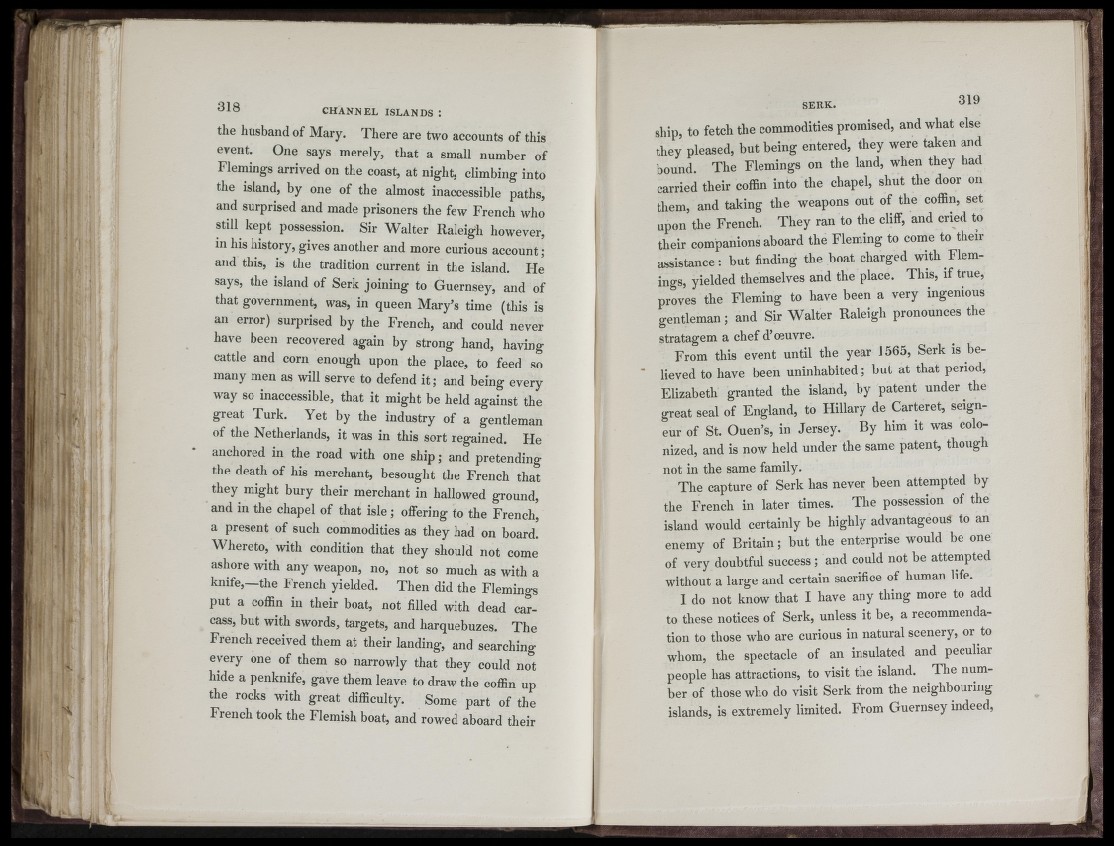
EH
t .__
)
. i i üi
I : F
Jfl »
<1 IH M fU ■:
: .,' lE
: ' ■!
I . i
I
. i i ' M - - .11 i, !' ' >1 ri : |ri
H 11 1 ri.
p j l ri'- ■1 ,. , ■ j. E
» Z ls f E :
p r ih i ri;
t A l , i i ; n
f ii
8 1 8 CHANNEL ISLANDS *.
the husband of Mary. There are two accounts of this
event. One says merely, that a small number of
Flemings arrived on the coast, at night, climbing into
the island, by one of the almost inaccessible paths,
and surprised and made prisoners the few French who
still kept possession. Sir Walter Raleigh however,
in his history, gives another and more curious account;
and this, is the tradition current in the island. He
says, the island of Serk joining to Guernsey, and of
that government, was, in queen Mary’s time (this is
an error) surprised by the French, and could never
have been recovered again by strong hand, having
cattle and corn enough upon the place, to feed so
many men as will serve to defend it; and being every
way so inaccessible, that it might be held against the
great Turk. Yet by the industry of a gentleman
of the Netherlands, it was in this sort regained. He
anchored in the road with one ship; and pretending
the death of his merchant, besought the French that
they might bury their merchant in hallowed ground,
and in the chapel of that isle; offering to the French,
a present of such commodities as they had on board.
Whereto, with condition that they should not come
ashore with any weapon, no, not so much as with a
knife,—the French yielded. Then did the Flemings
put a coffin in their boat, not filled with dead carcass,
but with swords, targets, and harquebuzes. The
French received them at their landing, and searching
every one of them so narrowly that they could not
hide a penknife, gave them leave to draw the coffin up
the rocks with great difficulty. Some part of the
French took the Flemish boat, and rowed aboard their
SERK. 819
ship, to fetch the commodities promised, and what else
they pleased, but being entered, they were taken and
bound. The Flemings on the land, when they had
carried their coffin into the chapel, shut the door on
them, and taking the weapons out of the coffin, set
upon the French. They ran to the cliff, and cried to
their companions aboard the Fleming to come to their
assistance: but finding the boat charged with Flemings,
yielded themselves and the place. This, if true,
proves the Fleming to have been a very ingenious
gentleman ; and Sir Walter Raleigh pronounces the
stratagem a chef d’oeuvre.
From this event until the year 1565, Serk is believed
to have been uninhabited ; but at that period,
Flizabeth granted the island, by patent under the
great seal of England, to Hillary de Carteret, seigneur
of St. Ouen’s, in Jersey. By him it was colonized,
and is now held under the same patent, though
not in the same family.
The capture of Serk has never been attempted by
the French in later times. The possession of the
island would certainly be highly advantageous to an
enemy of Britain ; but the enterprise would be one
of very doubtful success ; and could not be attempted
without a large and certain sacrifice of human life.
1 do not know that I have any thing more to add
to these notices of Serk, unless it be, a recommendation
to those who are curious in natural scenery, or to
whom, the spectacle of an insulated and peculiar
people has attractions, to visit the island. The number
of those who do visit Serk from the neighbouring
islands, is extremely limited. From Guernsey indeed.
'¡Ji ' i|